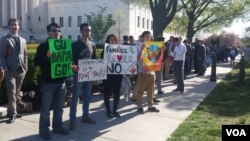About 10 million undocumented immigrants live in the U.S. Because they are not registered with authorities, undocumented immigrants often hide from the government.
For example, they do not pay taxes, and they cannot apply for driver’s licenses, jobs that require a work permit, or loans to buy houses.
If they are discovered, undocumented immigrants can be deported – in other words, sent back to their home countries.
But this week, the U.S. Supreme Court is considering whether to allow some undocumented immigrants to stay for a limited period and apply to work legally.
The Court’s decision will affect only undocumented immigrants who meet three criteria: those who have not been found guilty of a crime; those who have been in the U.S. for the past five years or more; and those who have a child who was born here or lives here legally.
About 4 million undocumented immigrants meet those criteria.
What could happen?
The Supreme Court will announce its decision this summer, probably in June.
The case revolves around a program called DAPA. It stands for “Deferred Action for Parents of Americans and Lawful Permanent Residents.”
President Barack Obama approved the program two years ago. One of the goals of the program was to keep families together. It also aimed to bring more people into legal work.
People who support DAPA say the program can greatly reduce the fear undocumented immigrants feel.
A six-year-old girl named Sophie Cruz spoke outside the Supreme Court building. She was born in the U.S., but her parents are here without documents. That means the government can force her parents to leave the country – and their daughter – at any time. “I ask the judges to protect us children and all immigrants,” Sophie Cruz said.
A representative from a teacher’s group also spoke. Cesar Moreno Perez said teachers know what happens when children come to school with fear: “Fear that their parents are not going to be home. Fear for themselves that they are going to be picked up on their way home.”
If the Supreme Court decides the DAPA program is legal, the government will protect approved undocumented immigrants. Those immigrants will receive a social security card, permission to work in the U.S., and a promise that they will not be forced to leave for three years.
At the end of three years, approved immigrants may apply again for the program.
What is the argument against DAPA?
Lawyers arguing against DAPA say the program is not legal. President Obama approved DAPA, but Congress never agreed to it. Under the U.S. Constitution, Congress usually makes the laws, and the president’s administration makes sure the laws are followed.
One of the Supreme Court justices, Anthony Kennedy, said of the DAPA program, “The president is setting policy and Congress is executing it. It seems upside down.”
However, the Constitution does allow the president to make an executive order. Those orders have the force of law, but they do not have to be approved by Congress. Future presidents may change an executive order.
President Obama said he approved DAPA because Congress has failed to improve the U.S. immigration system.
The state of Texas – along with 25 other states – are challenging Obama’s executive order in the Supreme Court. They say Obama does not have the power to do so much to change the country’s immigration laws.
Lower courts have agreed with the challengers. DAPA is currently frozen – or, not active – because previous judges have decided it is not legal.
What will the Supreme Court decide?
The Supreme Court includes nine justices; however, one justice recently died, leaving eight people on the Court. As a result, the DAPA case could end in a four-to-four tie.
A tie is especially possible because four justices usually follow a more liberal way of thinking, and four usually follow a more conservative way of thinking. If the case ends in a tie, the DAPA program will remain frozen, and undocumented immigrants will continue to risk being deported.
The Supreme Court could also decide not to decide. In other words, they could say that Texas and the other states do not have the right to sue in federal court.
If the Supreme Court throws out the case, Americans and politicians will have made no further progress on the question of undocumented immigrations.
I’m Katheen Struck.
Kelly Jean Kelly wrote this story for Learning English, with contributions from VOA reporters. Hai Do was the editor.
_______________________________________________________
Words in This Story
deport - v. to force a person to leave a country
throw out - phrasal verb, refuse to consider








